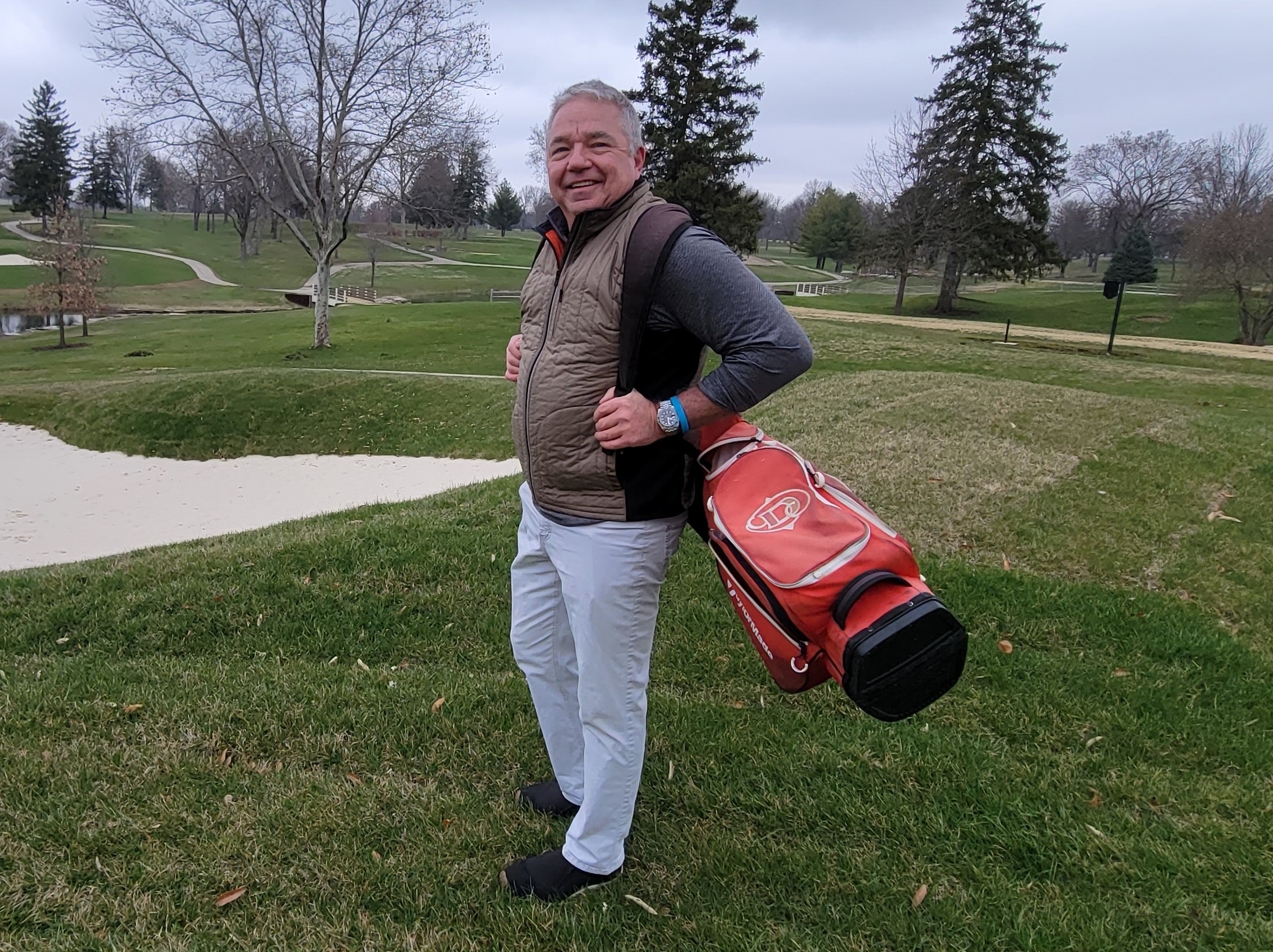Rookie Senior Golfers Reap Mental, Physical Benefits
George Salem was about 55 years old when he ventured out on a golf course with one of his buddies.
“I enjoyed it and went back again. I started playing once a week,” Salem, an associate professor at the University of Southern California, told The Epoch Times. “It was from that experience that I began to realize what a unique and comprehensive exercise experience golf was.”
Salem, 62, who spent much of his career developing exercise programs, realized there was something exceptional about golf once he began walking the courses in Southern California.
“It’s a recreational activity that’s very different from weightlifting or cardio-respiratory activities like walking, cycling, or rowing. Part of that is you’re in a group environment. There’s a lot of social support. It’s very addictive.”
Golf is also a sport that requires mental calculation, agility, fine motor control, and bursts of concentrated force.
Salem, director of an exercise and aging research program in the university’s biokinesiology and physical therapy division, decided to study the positive effects of golf after observing fellow golfers whose health exceeded that of other seniors.
“I was playing with guys who were 80 years old, who were way better golfers than I was, able to walk up and down hills, in and out of bunkers, around trees and roots,” he recalled. Salem said he walked a course with one golfer who had Parkinson’s disease and another man who played with one arm.
Salem developed a study for military veterans, 60 to 80 years old, and enlisted 12 men for a 12-week golf training course. Eight of the 12 participants had not played golf in the past 20 years, and the other four had limited experience. Some were combat veterans who reported mental challenges associated with their service.
This 2019 program produced positive results, including improvements in strength, balance, and agility. Brain function also improved.
“We found golf improved cognition with medium and large effect sizes,” Salem said, adding that the veterans’ memory and attention skills were tested before and after the program.
“Several veterans said it changed their life.
“One wife of a participant said it saved her husband’s life. He wasn’t getting off the couch. Now he couldn’t wait to get out twice a week and play golf.”
This training program included walking over hilly, uneven terrain, repeatedly bending to pick up or tee up golf balls, and “ballistic golf swings,” according to the study Salem co-authored that was published in the International Journal of Golf Science.
After completing the first study at a Veterans Administration golf course, Salem was encouraged to undertake another investigation of golf benefits for seniors at a public course. This was a 10-week program for male and female non-golfers, focusing on physical and cognitive brain functions.
This time, half of the 14 participants were women, including two who were 80 years old, and who had never played the game.
“And they loved it, and they loved coming every week,” Salem said. “They had aging problems, but were relatively healthy.”
All participants in the studies were tested for immediate recall, short delay recall, and long relay recall by being asked to repeat a list after various time increments. Participants were given a score for each test and a comprehensive score based on all three.
“They improved in immediate recall and comprehensive scores,” Salem said.
Another battery of cognition tests they were given measured attention, working memory, card-sorting, processing speed, and sequential memory. Salem said there were moderate improvements in attention, card-sorting, and working memory and an improvement in the composite score.
Physical tests also produced positive results, including improvement in balance while static or moving, leg power, grip strength, and awareness of body positioning.
“We saw that people walked faster after golfing. Walking speed is a really important measure of overall health,” Salem said. “The individuals walked faster at the end of the programs.”
Salem said his research shows that golf is an ideal comprehensive exercise activity for seniors, encouraging socialization and improving concentration and quality of life.
“It’s an activity that older adults can continue to play until the day they die,” Salem said.
“Our studies are showing that even if you’ve never played golf, as an older golfer, you can learn to play golf and enjoy it.
“There are golfers that are over 100 years old who are still playing. Unlike basketball or tennis, which are good for middle-aged and younger people, you are going to get to the age you can’t play those sports anymore. But you can continue to golf into your 80s and 90s. There’s even a 105-year-old golfer out there.”
Safety was an important concern for the program’s administrators, especially considering the lack of participants’ golf experience.
“We found with our program that you can safely learn to play golf as an older adult,” Salem said. “With both those programs, we had no adverse events. We had no injuries related to golf. We had no dropouts. Nobody reported that they didn’t like it, or it was hurting their back, nothing like that. So it is a safe sport for seniors.”
One of the most prominent indications of the enjoyment of the sport by older non-golfers was the high rate of attendance by participants during the 10- and 12-week programs.
“In the two studies, they attended 92 and 94 percent of all scheduled training sessions,” Salem said. “In most studies, if you have a 70 percent attendance rate, you are doing well. This is an unbelievably high rate. Our studies showed how people enjoyed it and continued to come back.”
Exit interviews were sent out to participants in the second study. All 10 of the respondents said they planned to continue to play golf.
Salem said the comments included these statements on their mental or emotional states:
“It improved my concentration.”
“I feel more relaxed.”
“I’m more relaxed and happier.”
“I’ve learned to handle my stress better.
The novice golfers made these comments on the social aspect:
“I met great people on my team.”
“I seem to be more tolerant.”
“Everyone in my group were like cheerleaders.”
“It opened up another way of enjoying friendships.”
Longtime Golfer Reports Long-Term Benefits

March 27, 2023.
Dr. Chuck Stone, a 63-year-old retired dentist, has been playing golf since he was 7 years old.
Unlike most senior golfers, who ride in motorized carts or push 3-wheeled carts, Stone carries his clubs on most of his rounds.
“It is really good exercise,” said Stone, who plays four or five times per week during the summer. “Golf is great for overall health.”
He said the benefits he enjoys include staying in shape physically and the joy of friendship and a focused state of mind.
“It is a six-mile hike, my bag weighs 25 pounds,” Stone said. “It’s like backpacking six miles. It keeps my weight down, You’re not sitting in front of a TV and eating.”
Carrying his clubs for up to 30 miles a week could translate to about half a pound per week of weight loss.
Stone, a cheerful man with many golf partners, gains much more than he loses on the course.
“Certainly just being with your friends and having fun has to be good for your mental health. I really look forward to golfing with my friends,” he told The Epoch Times.
“A lot of the time I feel a sense of euphoria, just being with my friends. You’re walking, it’s a beautiful day. I never carry my cell phone with me when I’m out playing golf. It stays in the car.”
Stone credits golf with helping him to stay mentally sharp.
“It’s a chess game you are playing in your mind,” Stone said. “Mental gymnastics are constant, as you try to figure out how to secure a good score on each hole, and think your way out of situations that will wreck your score.
“When you play an 18-hole round of golf you are keeping your mind busy for four or five hours. You’re learning how to do things under different circumstances. It’s an addictive game because you always want to have that perfect round.”
There are so many variables to contend with, including which club to choose and what kind of shot to hit.
“You are always getting yourself out of trouble,” Stone said, admitting he often repeats the same mistake. “You have to adjust to conditions on the course, which can be different from one green to another. Some are fast, while others are slow.”
Other forms of exercise, such as riding a stationary bike, are not mentally challenging, he said.
“Golf is a thinking man’s game.”
While focusing on all the challenges of the game, the cares and stresses outside the course tend to fade away.
“If you had a bad day, you tend to forget about that,” Stone said.
“When you’re golfing, you’re not thinking of your problems. You’re just playing golf. You are tuning out outside distractions.
“There are times you get angry at yourself, because of the way you are playing, but your friend will laugh at you. Then you have to laugh at yourself.”




